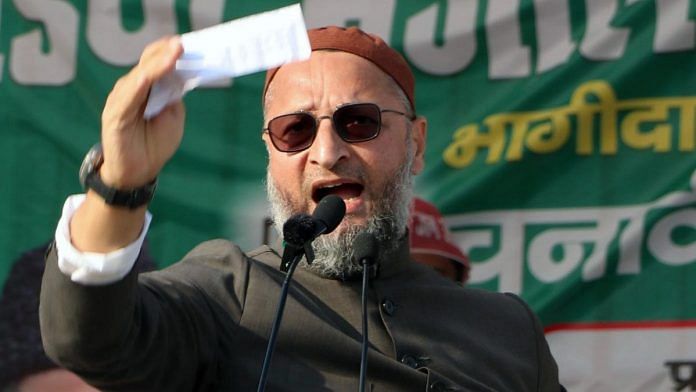New Delhi: Two Muslim-centric parties — the Social Democratic Party of India (SDPI) and the All India Majlis-e-Ittehadul Muslimeen (AIMIM) — failed to make a mark in the Karnataka assembly polls, results of which were declared Saturday.
The SDPI fielded candidates on 16 seats, but drew a blank, while Asaduddin Owaisi’s AIMIM, which contested two seats, failed to make any impact. Karnataka has a 13 per cent Muslim population, according to the 2011 census.
The minority community seems to have consolidated behind the Congress as indicated by the fact that the Janata Dal (Secular) — with its core Vokkaliga support base and following among Muslims in its south Karnataka stronghold — was reduced to 20 seats from 37 in 2018. Its vote share plummeted to 13.3 per cent from 18.3 per cent in the last election.
This election was the first since the ban on Islamist organisation Popular Front of India (PFI). The Ministry of Home Affairs had banned it for five years and notified it as an “unlawful association” under the Unlawful Activities (Prevention) Act last September. SDPI is the political wing of the PFI.
Asked why the PFI was banned but the SDPI was spared, BJP leaders like former minister K S Eshwarappa had then argued that the SDPI was a political party and the central government had to take the opinion of the Election Commission, after which Congress leader and former chief minister Siddaramaiah had slammed the BJP, alleging that the party was not banning SDPI in a bid to divide votes.
The two parties espousing the cause of Muslims were banking on perceived resentment within the community following a series of controversies over hijab, halal, Tipu Sultan and the Basavaraj Bommai government’s decision to scrap 4 per cent reservation for Muslims, in the run up to the elections. Calling the move illegal, Owaisi had said, “Why weren’t there protests? Why weren’t strong statements emanated from so-called secular leaders and parties?”
The last leg of the campaign saw the BJP raising the Hindutva tempo over the Congress’ promise of a ban on organisations like the Bajrang Dal and outlawed PFI, with Prime Minister Narendra Modi chanting ‘Bajrang Bali ki Jai’ during his rallies.
The SDPI fielded six of its 16 candidates from coastal Karnataka, which is considered a hotbed of Hindutva politics. Five of these seats — Puttur, Mangaluru, Bantwal, Belthangady and Moodbidri — fall in the district of Dakshina Kannada, while the sixth seat is Kaup in Udupi district. While none of the candidates could make a considerable impact, Abdul Majeed in Narasimharaja won 38,606 votes, securing 25 per cent of the vote share. Mangalore candidate Riyaz Farangipete secured nearly 10 per cent votes. Other SDPI candidates secured less than 4 per cent votes.
For the AIMIM, its Hubballi-Dharwad East candidate Durgappa Kashappa Bijawad secured 5,600 votes, while its Basavana Bagewadi candidate Allahbaksh Bijapur secured mere 1,472 votes. Congress candidates are leading on both seats.
The SDPI’s campaign fizzled out much before the voting started. After announcing that the party will be fielding candidates in 100 seats last year, only 16 candidates fought the polls. Similarly, last month, the AIMIM had announced that it will fight on 25 seats, but ended up fielding only two candidates.
In 2021, the SDPI and AIMIM had made inroads into Karnataka by winning seats in the urban local body polls. SDPI particularly had performed well in the coastal belt.
Also Read: AIMIM, SDPI, KRPP, AAP — how small parties can queer pitch for BJP & Congress in Karnataka
‘They weren’t in fray to win seats’
Some experts believe that SDPI and AIMIM were not really in the fray to win seats. “Their presence is felt where the victory margin was 5,000 to 10,000 votes. Like the Aam Aadmi Party, they also want to make their presence felt, they want to register the kind of electoral identity they have. I don’t think there were greater things to achieve for them,” Professor Chambi Puranik, a former faculty member in the political science department of the University of Mysore, told The Print.
“You can say instead of NOTA, they were there. Plus, they want to register their protest in a legitimate manner against polarisation,” he added.
In 2018, the SDPI had contested on three seats — Chickpet in Bengaluru, Narasimharaja in Mysuru, and Gulbarga Uttar in Kalaburagi district. While its overall vote share was only 0.12 per cent, the party had secured over 10 per cent votes in the three seats it contested. In Chickpet, the SDPI leader had won 11,700 votes, whereas the victory margin for BJP candidate over Congress’ was just 7,934. Similarly in the Narasimharaja seat, SDPI president Abdul Majeed with a significant 20 per cent vote share, though he didn’t win.
(Edited by Gitanjali Das)
Also Read: India’s TV news is in love with Asaduddin Owaisi—a Muslim leader for all seasons & reasons



